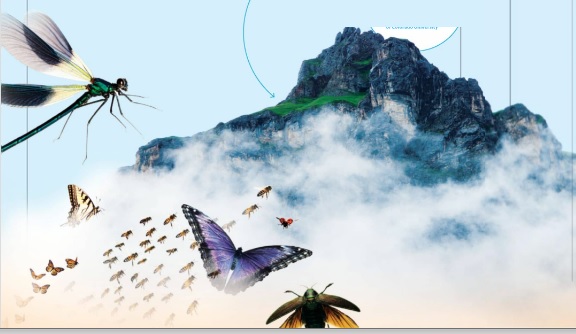Prøve GULL - Gratis
Running for the hills
The Guardian Weekly
|June 02, 2023
Around the world, insect species are responding to the climate crisis by shifting their habitats northwards and upwards, but this could have potentially catastrophic results for our ecosystems

In the Alps and Apennines of southern Europe, nearly all the longhorn beetles are moving uphill, and way up at the peaks, the isolation of a brown butterfly with orange-tipped wings is pushing it towards extinction. This is a snapshot of a global trend. With temperatures rising and pressure on biodiversity growing, insects vital to our ecosystems are not only moving north and south, but up.
Research shows many animals are making similar moves, but insects' high levels of mobility and short generation times allow them to respond quickly to change. Bumblebees in the Pyrenees have moved upwards on average by more than a metre a year, with some species making significantly greater journeys. Moths on Borneo's Mount Kinabalu have followed suit.
All of this makes them a useful indicator of the speed of climate change and ecological impacts at higher altitudes - often global biodiversity hotspots and havens for endemic species. To try to grasp the implications, scientists are filling their backpacks and lacing up their walking boots.
"If you want to track climate change on a mountain, you go a few metres. To do that with latitude, but on a flat basis, you have to move many kilometres," said Prof Jane Hill from York University.
Studies also show that reproduction and development can be hit as insects move upwards. For species long adapted to the cooler air of higher slopes, there are fixed limits to how far they can move to find conditions conducive to survival. And yet well over half of the mountain-dwelling insects that have been studied are shifting upwards.
Denne historien er fra June 02, 2023-utgaven av The Guardian Weekly.
Abonner på Magzter GOLD for å få tilgang til tusenvis av kuraterte premiumhistorier og over 9000 magasiner og aviser.
Allerede abonnent? Logg på
FLERE HISTORIER FRA The Guardian Weekly
The Guardian Weekly
My boyfriend's use of AI stops him thinking for himself
My boyfriend of eight years, who is 44, has ADHD and runs his own business.
2 mins
February 27, 2026

The Guardian Weekly
'Our land lets us all breathe clean oxygen'
The Congo River basin is home to a biodiverse ecosystem-and a relentless trade in timber and charcoal
3 mins
February 27, 2026

The Guardian Weekly
Nations apart: Andrew's UK arrest highlights US passivity on Epstein files
It is a tale of two nations.
2 mins
February 27, 2026

The Guardian Weekly
Under water: Engulfed by storms, but climate denial grows
In the week between Christmas and the New Year, two Spanish men in their early 50s - friends since childhood - went to a restaurant and did not come home.
3 mins
February 27, 2026

The Guardian Weekly
The crown in court
A brief history of royal run-ins with the law
3 mins
February 27, 2026

The Guardian Weekly
Big in Beijing
James Balmont's band, Swim Deep, plays to crowds of hundreds across the UK - but in China, they play to tens of thousands. And they're not the only ones
3 mins
February 27, 2026
The Guardian Weekly
Trump's Board of Peace is serving private interests more than public good
In Gaza, aid still trickles in at levels relief agencies say are far below what is required.
2 mins
February 27, 2026

The Guardian Weekly
Needle drops Weight-loss pills are here - and big pharma stands to gain
Oral tablets could bring obesity treatment into the mainstream, with the sector predicted to be worth $200bn by the end of the decade
6 mins
February 27, 2026

The Guardian Weekly
How Italians gradually warmed to their Winter Olympics
With the atmosphere in Rome subdued as the Winter Olympics unfolded across northern Italy, travelling to the Games was not on Amity Neumeister's radar.
3 mins
February 27, 2026

The Guardian Weekly
Fire and fury
Violence erupts as security forces kill feared cartel boss.
1 min
February 27, 2026
Translate
Change font size

